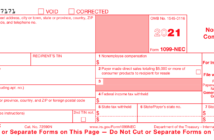Ah, yes! You now own a vacation property and it is making money. Then of course, you need to file your taxes. Don’t worry too much about this, it isn’t that bad once you know the process and what information is required to complete the appropriate forms on your tax return. In this post we will talk about all the information you need to gather as well as tips for each requirement. This will apply to the most common situations.
Table of Contents
Determine Your Property Participation Level
This may be confusing at first but this really is clear in most cases. You need to determine how you are renting your property: is it a side project or is it your main line of business? If you are running your rentals as a business, you probably already know this and may have got professional advice about it. Examples of people who are running a business are a full time Bed&Breakfast or a property manager who manages the day-to-day operations of multiple rentals on a full time basis.
If you are running your rentals as a business, this is called ‘materially participating’ in your rental activity. It is most likely the case that this does not apply to you.
The reason for the confusion is that with the advent of short term rental solutions, it is possible you pass the main test: average rental period of less than 7 days. However, there is a list of many other requirements and you need to be careful here and certain of your status.
What’s the benefit? If you can actually declare yourself as ‘materially participating’ in the rental activity you get to immediately deduct all of your losses in the year they occur. These include the non-cash depreciation charges we will discuss later.
You may still be able to deduct your losses in the year they occur, but you need to meet the income level tests. If you can’t, they will be carried over to the next year and not lost.
Determine Fair Rental Days
For most rental properties, fair rental days is usually the entire year (365 days) because the tenant gets 100% use of the property. Pretty simple. For vacation property landlords, however, it is likely that you will rent the property to many tenants and you may not be able to rent it 100% of the time.
For your purposes though, you should still indicate fair rental days of 365, even if you can only actually rent it for a portion of the year. This will insure that you get the full deductions on the property and not prorated by rental use.
These two numbers should add up to 365.
- Days rented
- Days offered for rent but not rented.
For completeness, this assumes that you owned the property the whole year and that you didn’t use it for personal use.
Tabulate Rents
First, obtain of the rent you have collected on the property for tax year. Rents can come from many places, don’t forget each one.
- Realtors, or other agencies.
- Airbnb, Booking.com or other online sites
- Your own rental website.
- Rents that you collect directly from friends and others.
The important detail to know about your rents is that your should summarize total gross rent before commissions, fees and adjustments. If you booked rents using third parties, they will report gross rent, which is typically a higher number versus what they sent you as payments. Another way of looking at this, gross rent is what the guest actually paid as rent.
When reporting to the IRS, third parties that collected rent on your behalf will provide gross rent. Most third parties provide this number along with commissions that were deducted, but if they don’t you may need to calculate this yourself. Don’t use the amount on the checks/payments that they send you for each rental.
As an example, here’s a more detailed look at how to determine your Airbnb rents, check out this article.
Question: A Homeaway guest was charged $5,000 for a weekly rental. The rental discount was adjusted later and the guest was refunded $150. What is the gross rent.
Answer: Report $5,000 as gross rent. Any adjustments would need to be accounted for after the fact.
Tabulate Commissions
Commissions are an expense. Typically, commissions are a component of gross rent and need to be separately accounted for on their own. Usually this is not a problem as third party rental providers will break this out for you. If they don’t you might need to calculate is yourself. Here’s an example.
Question: A realtor charges a 10% commission on rents. They sent me a check for $4,500 for a one week rental. What is the commission and gross rent?
Answer: The gross rent was $5,000, the commission was $500 ($5000 X 10%), resulting in a net payment of $4,500 to you, the host.
Summarize All Your Expenses
Whenever you pay money for a service, tax, utility or any other expense directly related to your rental property, you can deduct these expenses against your income. There are major categories that apply for tax reporting purposes and it is better to use these categories when collecting these expenses to ease your filing process.
The categories below are IRS categories that are simple categories where you simply need to add up each amount into a summary amount. We will cover the more complicated ones in the next sections.
| IRS Expense Category | Typical Expenses Reported |
|---|---|
| Advertising | Payments to promote your site (Google ads, online listing, etc) |
| Cleaning and maintenance | Payments to clean property, weed control, leaf pickup, power wash deck, etc. |
| Insurance | Property insurance, including fire/liability/flood. |
| Legal and other professional fees | Legal expenses, such as title search, variance application, other legal issues. |
| Management fees | If you pay a third party manager to handle your property rentals, this is their fees. |
| Mortgage interest | Interest on the property mortgage paid, if applicable. |
| Repairs | Fixes to property that are not major improvements. |
| Supplies | Any supplies used for your rentals: towels, soap, garbage bags, etc. |
| Taxes | Taxes, typically property taxes or other assessments on the property. |
| Utilities | Water, electric, WIFI, and the like. |
Auto And Travel Expenses
There are two ways to report your travel expenses. The first way to record actual expenses your incur for your vehicle and then calculate a deduction based upon your rental use. The second way is to calculate your mileage and tolls and use the standard mileage deduction. Unless you are in the business of managing rentals and run it as a business, the standard mileage deduction is the way to go.
It is very likely that you will use your vehicle for only a small portion that is related to your rental management. For tax purposes, you should record the following information that will be used in tax software to calculate your deduction:
- Total mileage during year.
- Mileage related to rental management.
- Tolls paid.
An easy way to manage this is to record your trips to the property then multiply this by the distance. Then add in mileage for other trips that are unusual or outside these trips (such as trips to the lumber yard, legal office, etc).
Determine Depreciation
This is where your reporting gets a little more complicated. Depreciation is a non-cash charge that is assessed on your property and improvements each year during the life of the property. These charges will typically reduce your earned income during the year, you may even report a “loss” on your property even though from a cash flow point of view you are making money. The depreciation will be recaptured when you sell the property or when the asset life expires.
For your purposes, the main asset you will initially depreciate is the property itself (the structure, not the land) when you bought the property.
Determine the following:
- Total Property Value
- Value of land
- Value of structure (property value – value of land).
If you don’t know where to find this information, you can use your town’s property assessment as a guide. The town tax assessor will offer an assessment for each component (land/structure). Note that this is a starting point because in many jurisdictions, assessments may be out of date to actual property values and building costs.
Question: I bought a property for $500K. The tax assessor provided a report indicating the property was worth $400K ($300K structure, $100K land). What is the depreciable amount?
Answer: Using the town’s assessment as a guide, $300K. Determine if this amount is a realistic cost of the structure as a portion of total property value. Adjust as necessary or seek advice from a tax attorney.
Summary
This article is a guide to gathering the information you need to complete your taxes on your vacation rental property. Once you have gathered all the information, it is recommended to use common tax software. The use of tax software will make the calculations and form entry a snap.


